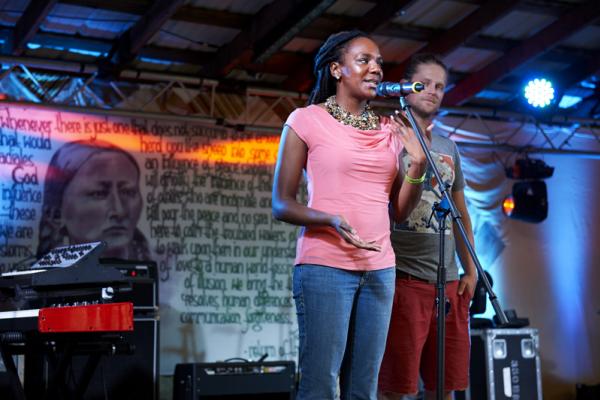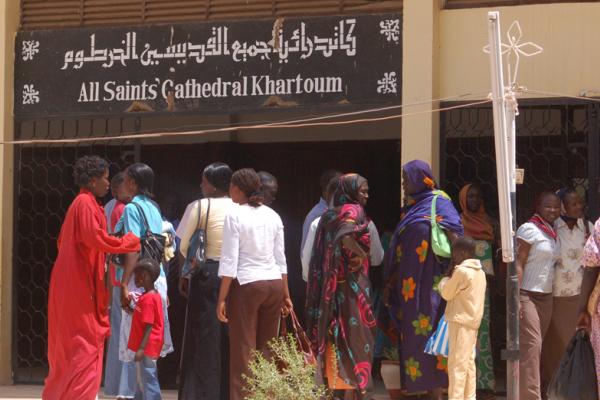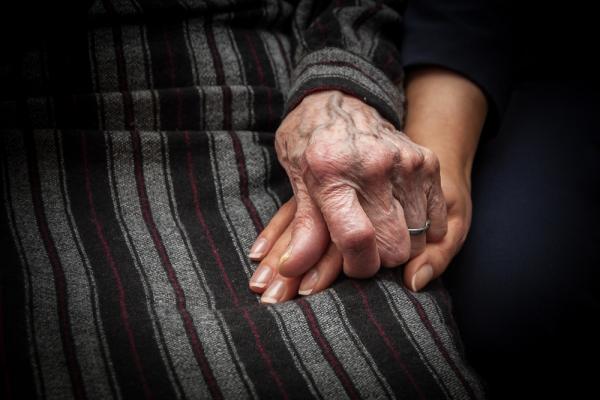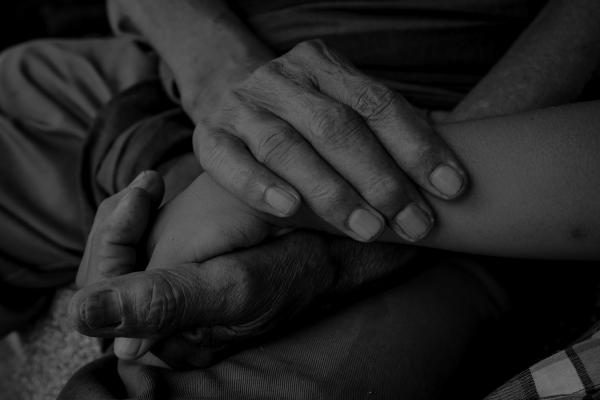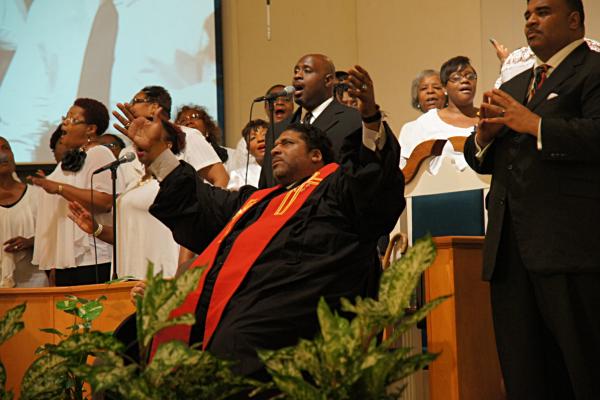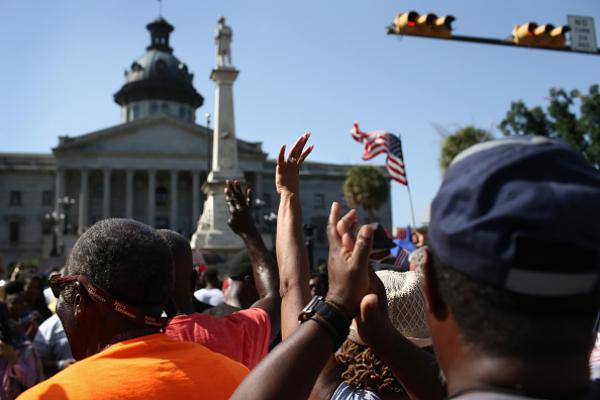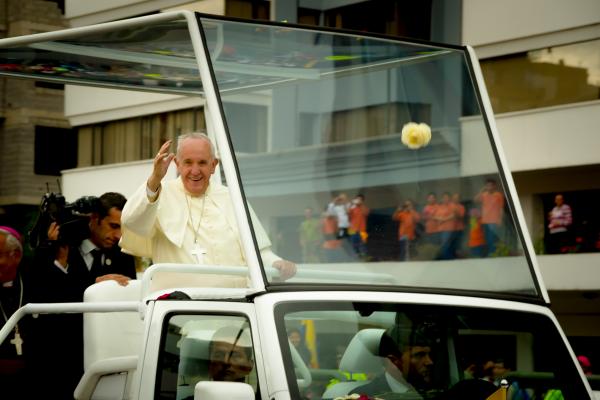As she prepared for her mission — scaling the 30-foot flagpole outside the South Carolina Statehouse to bring down the Confederate flag — Bree Newsome reread the biblical story of David and Goliath.
A youth organizer with Ignite NC, a nonprofit group challenging voting laws, Newsome appeared briefly to raucous cheers July 11 on the main stage of the Wild Goose Festival after speaking to a smaller crowd at the four-day camp revival that celebrates spirituality, arts, and justice.
The 30-year-old activist, a dedicated Christian, drew on the biblical story of the Hebrew shepherd boy who slays a giant with a sling and a stone.
“I don’t even feel like it was my human strength in that moment,” said Newsome.
“I’m honestly just so humbled.”
Sudanese authorities have detained 10 Christian students on a charge of indecent dressing, a criminal offense, after they wore miniskirts and trousers to church.
The young women were arrested last month in front of the Evangelical Baptist Church in the war-torn Nuba Mountains region in South Kordofan.
The girls, ages 17 to 23, had attended a ceremony at the church.
Police charged 12 women under Sudan’s 1991 Criminal Act, but two were released. The rest are to appear in court in coming days. If convicted, each will face 40 lashes.
The nursing home was quiet, which is typical for a late Sunday afternoon. I walked to the end of the hall where Grace lives in a room decorated with clown figurines that make her smile. I knocked at the doorway and announced myself. Grace was awake in bed, but upset about something.
“Oh, Joe! Come in! Can you do me a favor? I’ve lost something and could use your help finding it.”
Grace (not her actual name; I have to change it because of privacy laws) once had bright red hair that fit her personality. The red is gone now; her hair turned a pretty, cottony white after chemotherapy.
And today, something else was missing.
“I can’t find my left boob,” she said. “Would you be a dear and look around for it?”
“I will never talk to her ever again. I will never be able to hold her again. ...You hurt me. You hurt a lot of people. But I forgive you.”
Those words of accountability and forgiveness were spoken to Dylann Roof at his bond hearing by the family of one of his victims.
How are we to understand such radical forgiveness?
Many white Americans interpret black forgiveness as absolution for the racist attitudes that led to the attack. We distort that forgiveness in a way that doesn’t hold us accountable for changing the racist political, economic, and educational structures that infect our country.
When we celebrate black forgiveness but refuse to be accountable to that very forgiveness then we are doing nothing more than creating an aura of deniability. By celebrating black forgiveness of those persecutors like Dylann Roof, we can safely deny that we participate in and benefit from racist structures that persecute black people. In other words, we can so twist the blessed act of forgiveness that we manipulate it to deny that we are persecutors, too.
NC NAACP vs. McCrory is a necessary interruption to the institutionalized racism that is killing black and brown people. For all the talk around “black lives matter,” Rev. Barber warns, we are in danger of only affirming that black death matters if we accept that the martyrs of Charleston deserve nothing more than the removal of a Confederate flag from their state house. Yes, the flags should come down. But if they go away while the unjust laws remain, then it may be even harder for us to see that the root of injustice is in an imbalance of power.
And the fundamental power of citizenship in this country is still the franchise.
Flags are only symbols, of course. Chucking one for another does not automatically overhaul a society’s deeply entrenched structural oppression. Lowering a flag and relegating it, belatedly, to a museum does not change people’s hearts and minds. Under South Africa’s new flag, the Born Frees are inheriting a country awash in contradiction. How free can this generation be with one of the highest levels of income inequality in the world? With the rampant violence that especially plagues black townships and is frequently directed against women and girls? With the remnants of a broken school system that was not designed to educate all its citizens equally?
When the Confederate flag was removed from the South Carolina statehouse Friday morning, Gov. Nikki Haley spoke solemnly of the nine black churchgoers who were shot to death less than a month ago at Charleston’s Emanuel African Methodist Episcopal Church.
“We have all been struck by what was a tragedy we didn't think we would ever encounter,” Haley said of the horrifying massacre before she signed the bill with nine pens that will go to the families of the victims. “Nine amazing people that forever changed South Carolina's history."
Haley also referenced the “grace” shown by the nine families when they forgave the white gunman. She said their grace helped usher the state toward this long overdue decision. The assassinations at Emanuel AME, followed by forgiveness from the grieving families, were similarly cited by several South Carolina lawmakers as their reason for voting to remove the flag. Black Deaths Matter. That’s the painful and dangerous narrative being developed out of South Carolina. Only Black Deaths Matter. Our nation is capable of doing the right thing – such as taking down the Confederate flag in the year 2015, a flag that represents the racist, immoral, unconstitutional defense of slavery and Jim Crow – but only when black deaths happen and are met by a response deemed acceptable. Ever since this flag was raised in 1961 to send the message that South Carolina would not honor equal protection under the law, tens of thousands of small and large protests have not been enough to move the power brokers to take it down.
1. Read the First Chapter of Harper Lee’s ‘To Kill a Mockingbird’ Sequel
Happy Christmas in July! Read this excerpt of the much-anticipated Go Set a Watchman — due to be released on Tuesday. Or listen to the chapter, featuring narration by Reese Witherspoon, over at The Guardian.
2. Pope Apologizes for Catholic Church’s ‘Offenses’ Against Indigenous People
"I humbly ask forgiveness, not only for the offenses of the church herself, but also for crimes committed against the native peoples during the so-called conquest of America."
3. When Algorithms Discriminate
So there’s this, from the Upshot: "Research from the University of Washington found that a Google Images search for ‘C.E.O.’ produced 11 percent women, even though 27 percent of United States chief executives are women. (On a recent search, the first picture of a woman to appear, on the second page, was the C.E.O. Barbie doll.)"
The decision to focus just on the Christian relationships takes away from the complex and morally grey issues surrounding war. As a younger viewer, I left the film with a series of questions: did the directors think the U.S. intervention in Vietnam was justified? Should we have left at an earlier time? How do we deal with the ethical atrocities that were committed by U.S. forces, such as the use of napalm?
While Little Boy and Faith of Our Fathers are films made by different teams and creators with different interests, they both reflect an intrinsic tendency in the Christian film industry to "clean things up." Both films ignore the darker moral implications of the symbols they choose. While the filmmakers clearly want to remember the people who fought in these wars, their attempts at cleaning up history so that it’s family friendly doesn’t do the veterans the justice they deserve.
Pope Francis correctly points out that while “we are not yet tearing one another apart … we are tearing apart our common home," and that not defending our common home “is a grave sin."
The scientific community, Pope Francis believes, “realizes what the poor have long told us: Harm, perhaps irreversible harm, is being done to the ecosystem," Through human-made decisions that resulted in pollution and exploitation, Pope Francis declared, "The earth, entire peoples and individual persons are being brutally punished."
